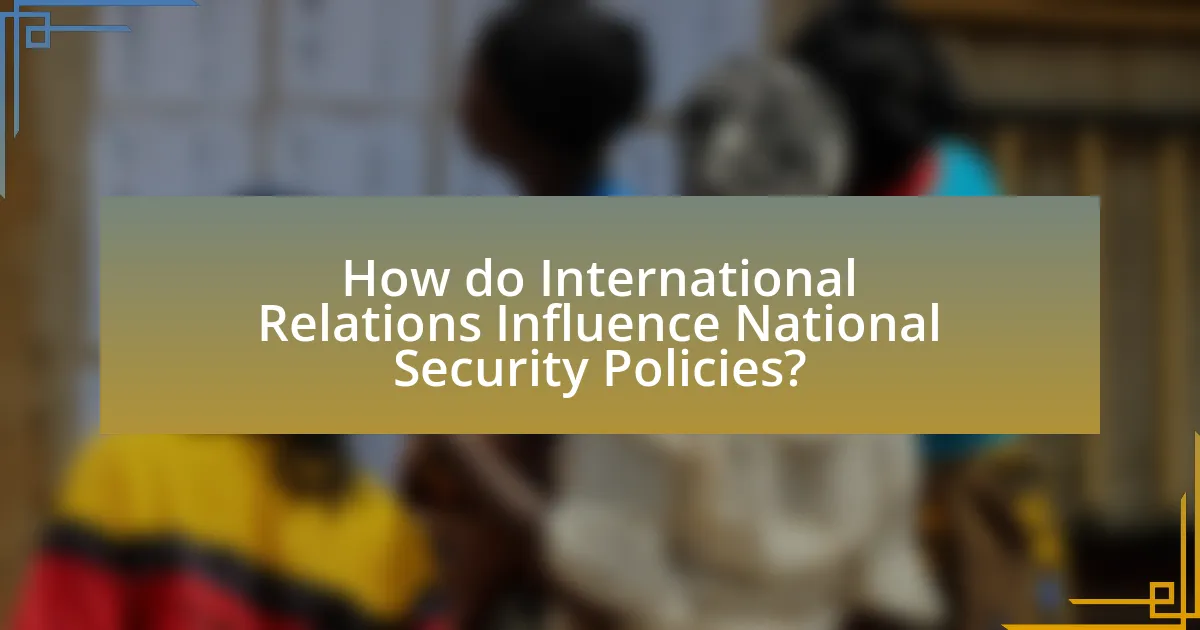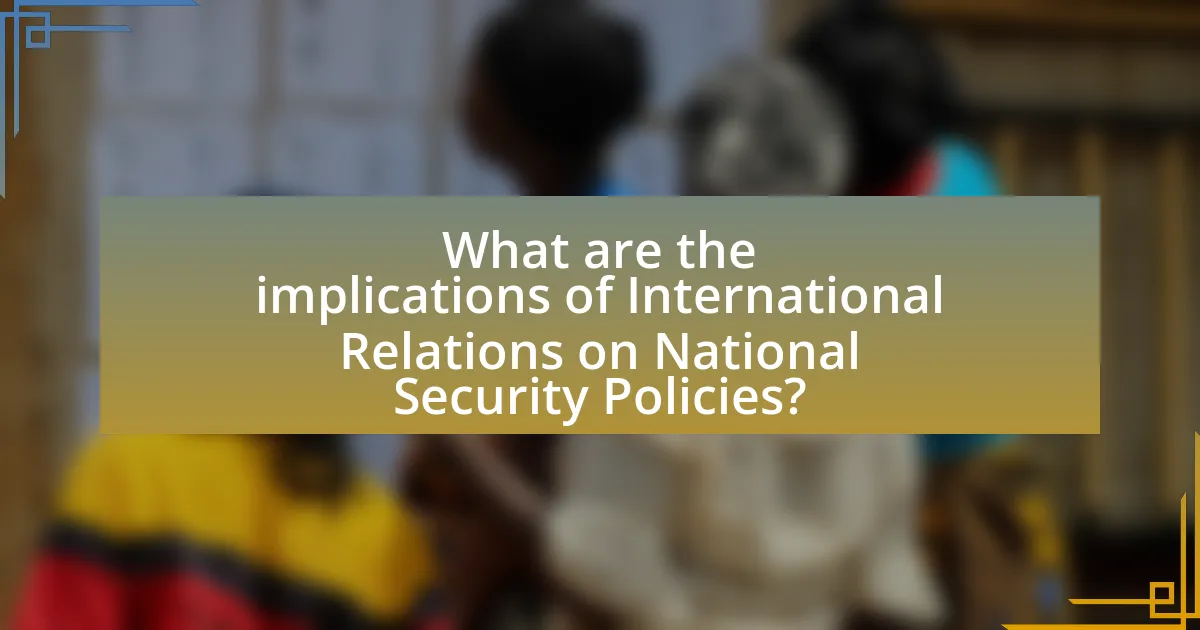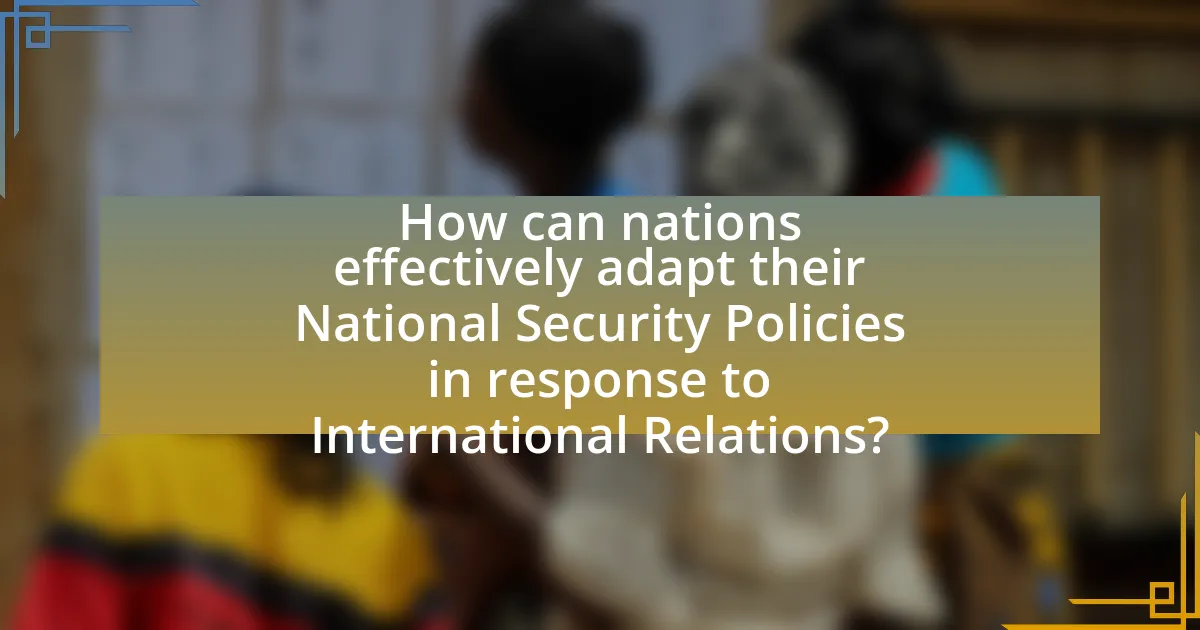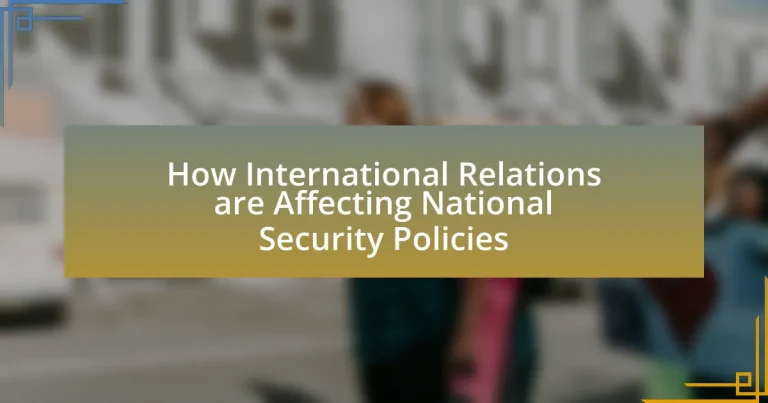The article examines the influence of international relations on national security policies, highlighting how alliances, geopolitical tensions, and historical contexts shape a nation’s defense strategies. Key factors such as power dynamics, economic interdependence, and international treaties are discussed, illustrating their impact on security decisions. The article also addresses the role of domestic politics, emerging threats, and the importance of diplomatic efforts in aligning national security with international relations. Through historical examples and contemporary challenges, it emphasizes the necessity for nations to adapt their security policies in response to the evolving global landscape.

How do International Relations Influence National Security Policies?
International relations significantly influence national security policies by shaping the strategic environment in which states operate. For instance, alliances and partnerships, such as NATO, compel member states to align their defense strategies and resource allocations with collective security objectives. Additionally, international conflicts, like the ongoing tensions between the U.S. and China, drive nations to reassess their military capabilities and diplomatic strategies to safeguard their interests. Historical examples, such as the Cold War, illustrate how ideological divides and power dynamics directly impacted national security decisions, leading to arms races and military buildups. Thus, the interplay of international relations and national security policies is evident through strategic alignments, conflict responses, and historical precedents.
What are the key factors in International Relations that affect National Security?
The key factors in International Relations that affect National Security include power dynamics, alliances, economic interdependence, and international law. Power dynamics, such as the balance of power theory, dictate how states interact and influence each other’s security policies; for instance, the rise of China has prompted shifts in U.S. defense strategies. Alliances, exemplified by NATO, enhance collective security but can also draw nations into conflicts. Economic interdependence, highlighted by trade relationships, can deter conflict but may also create vulnerabilities, as seen in the reliance on global supply chains. Lastly, international law, including treaties and conventions, shapes state behavior and can either bolster or undermine national security, as evidenced by arms control agreements that aim to prevent nuclear proliferation.
How do alliances and partnerships shape national security strategies?
Alliances and partnerships significantly shape national security strategies by enhancing collective defense capabilities and fostering diplomatic cooperation. For instance, NATO’s principle of collective defense, as outlined in Article 5, obligates member states to respond to an attack on any member, thereby deterring potential aggressors and promoting stability in the Euro-Atlantic region. Additionally, partnerships such as the U.S.-Japan alliance facilitate intelligence sharing and joint military exercises, which improve readiness and interoperability among forces. Historical examples, such as the formation of the Warsaw Pact in response to NATO, illustrate how alliances can influence the strategic calculations of nations, leading to shifts in military postures and defense spending.
What role do international treaties play in national security policies?
International treaties play a crucial role in shaping national security policies by establishing legally binding commitments among states to cooperate on security matters. These treaties, such as the North Atlantic Treaty Organization (NATO) agreement, create frameworks for collective defense, thereby enhancing the security of member states through mutual obligations. For instance, Article 5 of the NATO treaty stipulates that an armed attack against one member is considered an attack against all, which deters potential aggressors and fosters a collaborative security environment. Additionally, treaties like the Treaty on the Non-Proliferation of Nuclear Weapons (NPT) aim to prevent the spread of nuclear weapons, thereby contributing to global stability and reducing the likelihood of nuclear conflict. Such agreements not only influence military strategies but also guide diplomatic relations, making them integral to national security policies.
Why is understanding International Relations crucial for national security?
Understanding International Relations is crucial for national security because it enables nations to navigate complex global dynamics and anticipate potential threats. By analyzing relationships between countries, governments can identify allies, assess adversaries, and formulate strategies to protect their interests. For instance, the Cold War exemplified how misinterpretations of international relations could lead to escalated tensions and conflicts, highlighting the importance of diplomatic engagement and intelligence in maintaining security. Furthermore, contemporary issues such as terrorism, cyber threats, and climate change require a nuanced understanding of international cooperation and conflict, making the study of International Relations essential for effective national security policies.
How do geopolitical tensions impact national security decisions?
Geopolitical tensions significantly influence national security decisions by prompting governments to reassess their defense strategies and resource allocations. For instance, when tensions arise between nations, such as the ongoing conflicts in Eastern Europe, countries often increase military spending and enhance their defense postures to deter potential threats. Historical examples include NATO’s response to Russia’s annexation of Crimea in 2014, which led to increased troop deployments and military exercises in Eastern Europe. This demonstrates that geopolitical tensions compel nations to prioritize security measures, adapt their foreign policies, and engage in alliances to safeguard their interests.
What historical examples illustrate the connection between International Relations and national security?
The Cold War exemplifies the connection between International Relations and national security, as the geopolitical tension between the United States and the Soviet Union directly influenced national security policies worldwide. During this period, both superpowers engaged in arms races, forming military alliances such as NATO and the Warsaw Pact, which were rooted in their international relations strategies. The Cuban Missile Crisis in 1962 further highlighted this connection, as the U.S. perceived the Soviet deployment of nuclear missiles in Cuba as an existential threat, prompting a reevaluation of national security strategies and diplomatic negotiations. Additionally, the post-9/11 era demonstrated how international relations, particularly in the context of terrorism, reshaped national security policies in the United States and its allies, leading to the implementation of the Patriot Act and military interventions in Afghanistan and Iraq. These historical examples illustrate how international relations dynamics directly impact national security considerations and policy formulations.

What are the implications of International Relations on National Security Policies?
International relations significantly influence national security policies by shaping the strategic environment in which states operate. For instance, the dynamics of alliances, rivalries, and international norms dictate how nations prioritize their security concerns and allocate resources. Historical examples include the Cold War, where the bipolar structure of international relations led to extensive military buildups and the establishment of deterrence strategies among superpowers. Additionally, contemporary issues such as terrorism and cyber threats have prompted nations to adapt their security policies to address non-traditional security challenges, reflecting the evolving nature of international relations. Thus, the interplay between international relations and national security policies is critical in determining a nation’s approach to safeguarding its interests and responding to global threats.
How do changes in global power dynamics affect national security approaches?
Changes in global power dynamics significantly influence national security approaches by prompting nations to reassess their strategic priorities and alliances. For instance, the rise of China as a global superpower has led countries like the United States to pivot their military focus towards the Indo-Pacific region, as evidenced by the 2017 National Security Strategy, which identifies China as a primary competitor. Additionally, shifts in power can lead to new security partnerships; for example, the formation of AUKUS between Australia, the UK, and the US reflects a response to perceived threats from China. These adaptations in national security strategies are often driven by the need to address emerging threats and maintain geopolitical stability in an evolving international landscape.
What impact does economic interdependence have on national security policies?
Economic interdependence significantly influences national security policies by creating a complex web of mutual reliance that can deter conflict and promote cooperation among states. This reliance often leads nations to prioritize diplomatic solutions over military confrontations, as the costs of conflict can disrupt economic ties and harm both parties. For instance, the economic relationship between the United States and China has led to a focus on dialogue and negotiation in areas of tension, such as trade disputes and regional security issues, rather than outright military engagement. Additionally, research indicates that countries with strong economic ties are less likely to engage in wars against each other, as seen in the European Union, where economic integration has contributed to lasting peace among member states. Thus, economic interdependence shapes national security policies by fostering collaboration and reducing the likelihood of conflict.
How do emerging threats in International Relations redefine security priorities?
Emerging threats in International Relations, such as cyber warfare, terrorism, and climate change, significantly redefine security priorities by shifting focus from traditional military threats to non-state actors and transnational issues. For instance, the rise of cyber attacks has prompted nations to prioritize cybersecurity measures, as evidenced by the increasing budgets allocated to cyber defense in countries like the United States, which proposed a $9.8 billion budget for cybersecurity in 2022. Additionally, the impact of climate change on national security has led to the recognition of resource scarcity and migration as critical security concerns, influencing policies to address these challenges. This shift illustrates how the evolving landscape of threats necessitates a comprehensive approach to security that encompasses a broader range of risks beyond conventional military engagements.
What challenges do nations face in aligning their security policies with International Relations?
Nations face significant challenges in aligning their security policies with International Relations due to differing national interests, geopolitical tensions, and varying interpretations of security threats. These challenges arise because countries prioritize their own security needs, which may conflict with international norms or agreements. For instance, the United States and China have divergent security policies influenced by their respective strategic interests in the Asia-Pacific region, leading to tensions that complicate cooperative security efforts. Additionally, the rise of non-state actors and transnational threats, such as terrorism and cyber warfare, further complicates the alignment of security policies, as nations must navigate complex international frameworks and multilateral agreements that may not fully address their unique security concerns.
How do domestic politics influence national security policy in the context of International Relations?
Domestic politics significantly influence national security policy by shaping the priorities and strategies of governments in response to public opinion, interest groups, and political parties. For instance, electoral cycles often compel leaders to adopt security policies that resonate with voters, as seen in the United States where public sentiment after events like 9/11 led to the implementation of the Patriot Act, reflecting a heightened focus on counterterrorism. Additionally, lobbying by defense contractors and advocacy groups can steer policy decisions, as evidenced by the influence of the military-industrial complex on U.S. foreign policy, which often prioritizes military spending and interventionist strategies. Thus, domestic political dynamics directly affect how nations formulate and execute their national security policies within the broader context of international relations.
What are the risks of neglecting International Relations in national security planning?
Neglecting International Relations in national security planning poses significant risks, including increased vulnerability to external threats and diminished diplomatic leverage. When a nation fails to engage with international partners, it may miss critical intelligence and strategic alliances that can enhance its security posture. Historical examples, such as the lack of international cooperation leading up to World War II, illustrate how isolationist policies can result in catastrophic consequences. Additionally, neglecting these relations can lead to misunderstandings and conflicts, as seen in the Cold War, where miscommunication escalated tensions. Ultimately, a comprehensive approach that incorporates international relations is essential for effective national security planning.

How can nations effectively adapt their National Security Policies in response to International Relations?
Nations can effectively adapt their National Security Policies in response to International Relations by conducting comprehensive assessments of global threats and opportunities, and aligning their strategies accordingly. This involves analyzing geopolitical shifts, emerging security challenges, and the dynamics of alliances and rivalries. For instance, the rise of cyber threats has prompted countries like the United States to enhance their cybersecurity frameworks within their national security strategies, as evidenced by the establishment of the Cybersecurity and Infrastructure Security Agency in 2018. Additionally, nations must engage in diplomatic efforts to foster international cooperation, as seen in the Paris Agreement, which reflects a collective approach to addressing climate change as a security issue. By continuously evaluating and adjusting their policies based on these factors, nations can maintain resilience and adaptability in an ever-changing international landscape.
What strategies can be employed to enhance national security through International Relations?
To enhance national security through International Relations, countries can employ strategies such as forming strategic alliances, engaging in multilateral diplomacy, and participating in international organizations. Strategic alliances, like NATO, provide collective defense mechanisms that deter aggression and enhance security through shared resources and intelligence. Multilateral diplomacy allows nations to address global security challenges collaboratively, as seen in the United Nations’ peacekeeping missions, which have been effective in conflict resolution and stability. Additionally, participation in international organizations fosters cooperation on security issues, exemplified by treaties like the Non-Proliferation Treaty, which aims to prevent the spread of nuclear weapons and promote disarmament, thereby contributing to global security.
How can diplomatic efforts mitigate security threats arising from International Relations?
Diplomatic efforts can mitigate security threats arising from International Relations by fostering communication, building trust, and facilitating conflict resolution among nations. Effective diplomacy, such as negotiations and treaties, can address underlying tensions and prevent escalation into armed conflict. For instance, the 2015 Iran nuclear deal, formally known as the Joint Comprehensive Plan of Action, exemplifies how diplomatic engagement can lead to agreements that reduce the threat of nuclear proliferation, thereby enhancing regional and global security. Additionally, diplomatic channels allow for the exchange of intelligence and cooperation on security issues, which can further diminish the likelihood of misunderstandings and military confrontations.
What role does intelligence sharing play in strengthening national security policies?
Intelligence sharing plays a critical role in strengthening national security policies by enhancing situational awareness and enabling timely responses to threats. When nations collaborate and exchange intelligence, they can identify potential risks more effectively, leading to proactive measures that mitigate security challenges. For instance, the sharing of intelligence between the United States and its allies has historically led to successful counterterrorism operations, such as the disruption of plots against civilians. This collaborative approach not only improves the accuracy of threat assessments but also fosters trust and cooperation among nations, which is essential for a unified response to global security issues.
What best practices should nations follow to align their security policies with evolving International Relations?
Nations should adopt a proactive approach to align their security policies with evolving International Relations by engaging in continuous diplomatic dialogue and multilateral cooperation. This practice ensures that nations remain informed about global security dynamics and can adapt their policies accordingly. For instance, the establishment of international frameworks such as the United Nations Security Council facilitates collaboration on security issues, allowing nations to address threats collectively rather than in isolation. Additionally, nations should invest in intelligence-sharing agreements, which enhance situational awareness and foster trust among allies. Historical examples, such as NATO’s collective defense principle, demonstrate the effectiveness of cooperative security arrangements in responding to emerging threats. By prioritizing diplomacy and collaboration, nations can effectively navigate the complexities of modern International Relations and enhance their national security.
How can nations build resilience against international security challenges?
Nations can build resilience against international security challenges by enhancing their diplomatic relations, strengthening military capabilities, and investing in cybersecurity. Effective diplomacy fosters collaboration and trust among nations, which can lead to collective security agreements and conflict resolution mechanisms. For instance, NATO’s collective defense principle demonstrates how alliances can deter aggression and enhance security. Strengthening military capabilities involves modernizing armed forces and conducting joint exercises, which improve readiness and interoperability among allies. Additionally, investing in cybersecurity protects critical infrastructure from cyber threats, as evidenced by the increasing number of cyberattacks on national systems, highlighting the need for robust defenses. These strategies collectively contribute to a nation’s ability to withstand and respond to various security challenges.
What are the key considerations for policymakers in integrating International Relations into national security frameworks?
Policymakers must consider the alignment of national interests with international obligations when integrating International Relations into national security frameworks. This involves assessing geopolitical dynamics, such as alliances and rivalries, to ensure that national security strategies are responsive to global threats and opportunities. For instance, the rise of non-state actors and transnational terrorism necessitates a collaborative approach with international partners, as evidenced by NATO’s collective defense strategy, which emphasizes mutual support among member states. Additionally, policymakers should evaluate the impact of economic interdependence on security, recognizing that trade relationships can both enhance and undermine national security. The integration of diplomatic tools alongside military capabilities is crucial, as demonstrated by the use of sanctions and negotiations in addressing nuclear proliferation issues. Ultimately, a comprehensive understanding of international relations enhances the effectiveness of national security policies by fostering resilience against external challenges.
What practical steps can nations take to improve their national security policies in light of International Relations?
Nations can improve their national security policies by enhancing diplomatic engagement and fostering multilateral cooperation. Strengthening alliances through organizations like NATO or the United Nations allows for shared intelligence and resources, which can mitigate threats. For instance, the 2017 NATO summit emphasized increased defense spending among member states, reinforcing collective security commitments. Additionally, nations should invest in cybersecurity measures, as cyber threats have become a significant aspect of international relations; the 2020 SolarWinds cyberattack highlighted vulnerabilities that can be addressed through international collaboration. Finally, adopting comprehensive risk assessments that consider geopolitical dynamics can help nations anticipate and respond to emerging threats effectively.


